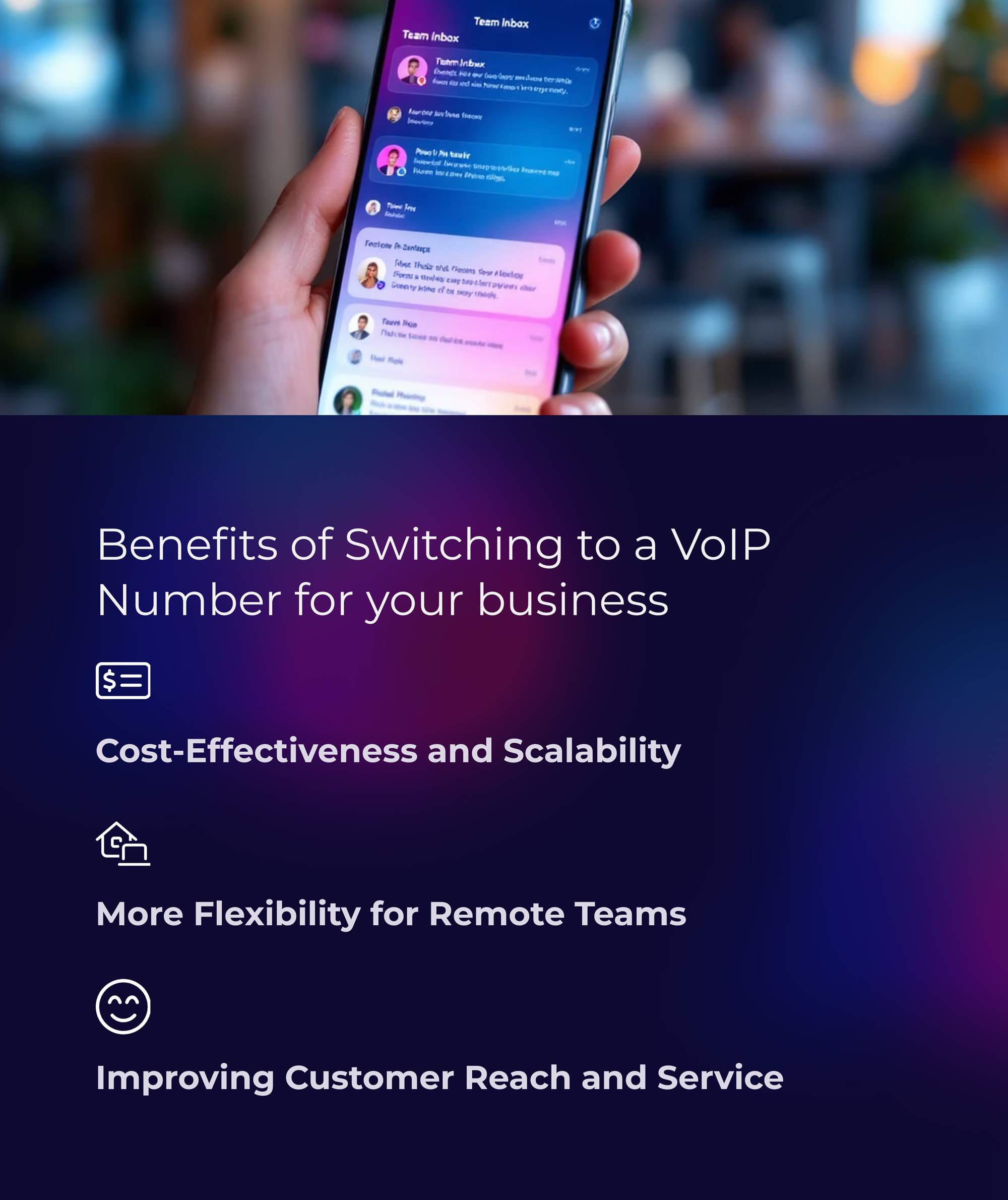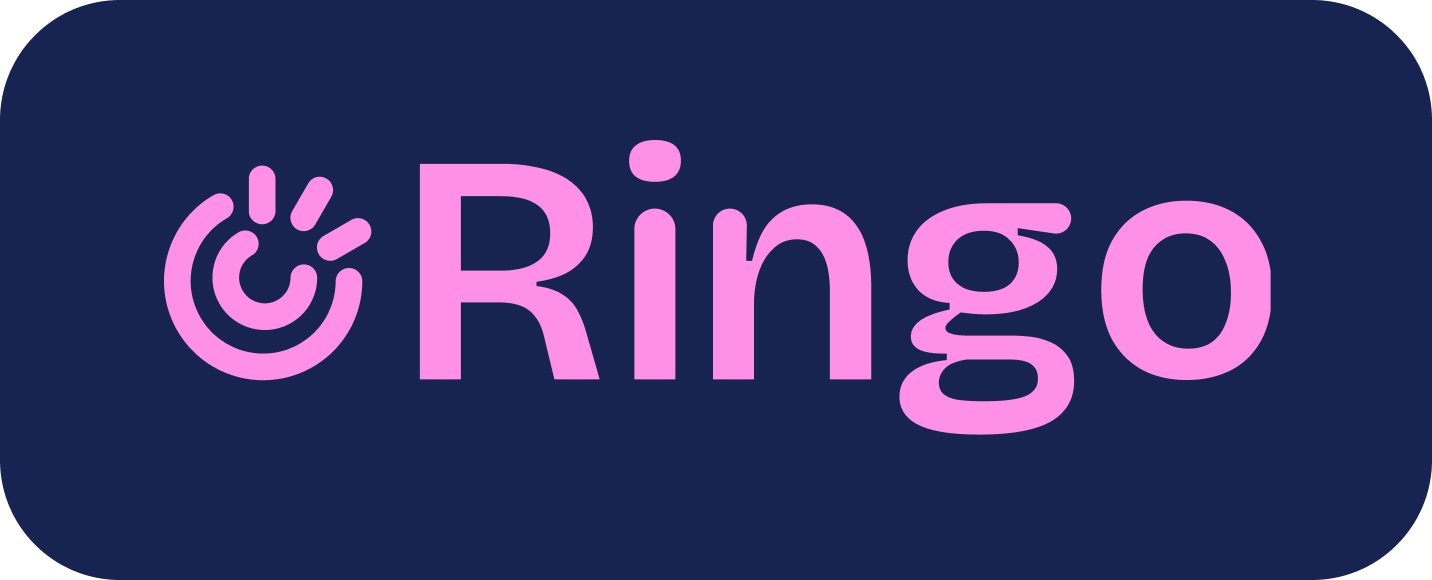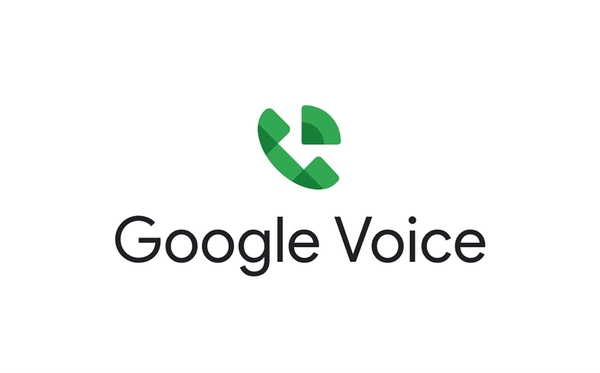What Is a VoIP Number and Its Benefits for Small Businesses?

What is a VoIP number?
A VoIP number (short for Voice over Internet Protocol) is a virtual phone number that works over the internet instead of old-school multiline phone systems. That means you can make and take calls from your laptop, smartphone, or pretty much any device with Wi-Fi. No wires, no desk phones, no being tied to the office.
It’s a flexible, low-cost way to stay connected - whether you’re at your salon, out showing homes, or working from your kitchen table. And it often comes with smart features like shared team inbox, SMS broadcasts, and the ability to keep your number even if you switch devices or locations and a lot more, it will all depend on the provider you choose.
Bottom line: it makes it easier (and cheaper) to talk to customers, support your team, and keep your business running smoothly.
How do VoIP numbers work?
Let’s try to break it down in an easy and straightforward way to understand: With VoIP calls, when you talk to a customer over the phone, your voice gets turned into tiny bits of data, like little digital puzzle pieces. Those pieces travel through the internet to the person you’re calling. If they’re using VoIP too, their phone puts the pieces back together into your voice. If they’re on a regular phone, a special system translates it so they still hear you clearly.
Difference between VoIP Numbers and Regular Phone Numbers
Traditional phone numbers are tied to a landline or cell network, they only work from specific locations or devices. VoIP numbers, on the other hand, use the internet to make and receive calls, giving you a lot more flexibility.
Plus, virtual numbers can come (depending on the provider) with smart features that regular phone lines just can’t offer:
- Call forwarding to any device so you never miss a customer call
- Receive and send SMS/text messages from your business number to customers
- Shared team inbox: allow your team to see and reply to customers directly
- AI-powered tools like voicemail transcriptions or call summaries
- SMS broadcast capabilities to send promotions or updates to many customers at once
- Caller ID, custom greetings, and voicemail to keep things professional and organized

Benefits of Switching to a VoIP Number for your business
Cost-Effectiveness and Scalability
Switching to a VoIP number is one of the easiest ways for small businesses to cut phone costs without sacrificing quality. Since virtual numbers runs on your internet connection, there’s no need for expensive landlines or complicated setups, and monthly bills are often much lower. All of that while getting more powerful features as well.
Scalability is a major win too. Need to add a line for a new hire or pause one for the off-season? No problem. With providers like Ringo, you get flexible pricing that adapts to your business, so you only pay for the actual conversations your business is having with customers. It's a cost-effective, modern solution that grows with you and keeps your communication running smoothly.
Enhanced Mobility and Flexibility for Remote Teams
VoIP makes it way easier for small business teams to stay connected, no matter where they’re working from. Whether your receptionist is handling calls from home, your field tech is checking voicemails from their truck, or you're replying to customers between appointments, VoIP keeps the whole team in sync. You can take calls on a smartphone, laptop, or tablet - no fancy hardware required.
Improving Customer Reach and Service
Great customer service is what keeps customers coming back - and for small businesses, that means being easy to reach and quick to respond. VoIP tools help make that possible in two powerful ways.
First, a shared team inbox means everyone on your team can see and manage incoming calls and texts from one place. No more wondering who followed up or missing a message during a busy day. It keeps your communication organized and helps your team stay on top of every customer request, whether you’re all in one office or working remotely.
Second, features like SMS broadcasts let you send one message to many customers at once. It’s perfect for holiday season, limited-time offers, or last-minute updates. Instead of calling people one by one, you can keep your entire customer base informed in just a few clicks. It's an amazing tool to re-engage with customers and boost loyalty.
Together, these tools help small teams deliver big-time service without added stress.
Setting Up Your Business VoIP System
Setting up a virtual number system for your small business is simpler than you might expect. Providers like Ringo, OpenPhone, Dialpad, and Grasshopper offer flexible plans designed for small teams. Most systems are easy to install, require little to no hardware, and can be up and running in just a few steps, no tech expertise needed.
Choosing the Right VoIP Provider and Plan
Finding the right VoIP provider comes down to three things: pricing, features, and fit for your business size. Providers like Ringo, OpenPhone, Dialpad, and Grasshopper all offer business–friendly plans, but they vary in what’s included. You can find a feature comparison guide here and pricing comparison here to see which solution matches your needs.
Look for essentials like shared team inbox, SMS broadcasts, call forwarding, and integrations with tools you already use. If your team is growing and you would like to make use of AI to facilitate your work make sure to look for that too.
Don’t forget about customer support. Reliable, fast help can make a big difference, especially when you’re running a business and can’t afford downtime. Ringo, for example, is known for its transparent pricing and responsive support, which makes it a great option for lean teams that need flexibility.
Necessary Equipment and Setup Process
A VoIP number allows users to select an area code that may not correspond to their physical location, enabling greater flexibility in communication across different regionsSetting up a VoIP system is quick and affordable. All you need is a stable internet connection and a device like a phone, laptop, or desktop. Most providers - like Ringo, OpenPhone, and Dialpad - offer free trials, so you can test things out before committing.
Just choose your area code, download the app, follow the setup steps, and start making calls. Be sure to check that everything works smoothly and that your team is connected too.

Overcoming Challenges with VoIP
Like any tech, VoIP isn’t perfect. You might run into issues like call quality problems or security concerns - but most of these are easy to manage with the right setup.
Strong internet is key to clear calls. And trusted VoIP providers offer built-in security features like encryption, spam blocking, and reliable support when something goes wrong. As long as you’re using a well-rated service and have a stable connection, VoIP is a dependable and secure way to keep your business running smoothly.
Addressing Common VoIP Concerns and Issues
Worried about call quality? That’s one of the most common concerns with VoIP - but it mostly comes down to your internet. A strong, stable broadband connection makes all the difference in keeping calls clear and reliable.
Some business owners also worry that switching from a traditional phone system will be complicated. But most VoIP providers make the process simple. They’ll help you transfer your existing number and walk you through setup.
With the right provider and a solid internet connection, these early concerns usually fade fast.
Why VoIP Compliance Matters for SMBs
VoIP systems offer flexibility and cost savings, but they also come with regulatory obligations. Failing to comply with rules like STIR/SHAKEN or E911 can result in call blocking, emergency response delays, or legal risk. For SMBs, this means ensuring caller ID authentication, maintaining accurate location data for 911 calls, and choosing providers who stay current with FCC requirements. Proper VoIP compliance not only keeps you legal, it ensures your calls reach customers and support teams can act fast in emergencies.
Practical Uses of VoIP Numbers
For small businesses, VoIP numbers are all about staying organized and responsive - without overcomplicating things.
Let’s say you run a salon, a plumbing service, or a real estate office. With a VoIP system, your whole team can use one shared business number to handle calls and texts, whether they’re at the front desk or out in the field. That shared inbox makes it easy to see who followed up with a customer and what messages still need attention, so nothing slips through the cracks.
One especially useful feature is SMS broadcasts. You can send a quick message to all your customers at once, great for appointment reminders, promo offers, or last-minute schedule changes. It saves time and keeps your business top-of-mind.
VoIP also gives you flexibility. You can take calls on your cell phone, respond to messages on a laptop, and add team members as you grow, without needing extra lines or equipment. It’s a simple way to run smoother, more connected communication every day.
Conclusion
In short, getting a VoIP number is a smart move for small businesses that want to communicate better, save money, and stay flexible. Whether you’re just starting out or growing fast, VoIP makes it easier to manage calls, connect with customers, and keep your team in sync, no matter where they’re working from.
It’s a simple upgrade that helps you stay competitive, professional, and ready to grow. If you're thinking about improving your business communication, now’s a great time to explore VoIP solutions powered by a new system that fit your needs.
Frequently Asked Questions
What is required to start using a VoIP number?
Getting started with a VoIP number is pretty simple. You’ll need a solid internet connection, a device like a smartphone or computer and an account with a VoIP provider. Once you’re signed up and set up, you can start making calls over the internet—no landlines or extra hardware required. With the right setup, talking to customers online becomes just as easy (and often clearer) than using a traditional phone.
How reliable are VoIP numbers for business operations?
VoIP numbers work well when you have a steady internet connection. A good VoIP service provider helps keep your call quality high. This is good for customer experience and lets your business run without breaks. With a trusted service provider and a working internet connection, you can count on your calls to be clear and smooth.
Can I keep my old business number when switching to VoIP?
Yes, most VoIP providers let you keep your old number. This process is called number portability. You can move your old business number to the new phone system. By doing this, your business phone stays the same for your customers. It will not change your business phone system or how people reach you, so your brand stays strong.
Why would a person have a VoIP number?
Individuals may choose a VoIP number for its cost-efficiency, flexibility, and advanced features compared to traditional phone services. These numbers allow seamless communication from various devices, making it easier to manage business calls remotely while also providing enhanced options for customer interaction and call management.
What is a VoIP Caller?
A VoIP caller is someone who uses Voice over Internet Protocol (VoIP) technology to make phone calls using the internet instead of traditional telephone lines. This means that rather than sending voice data through a circuit-switched network, VoIP converts your voice into digital packets and transmits them over an IP network. VoIP callers can use various devices such as computers, smartphones, or dedicated VoIP phones, allowing for features like video calling, call recording, and lower long-distance rates. It's like chatting with a friend online but with the added bonus of it sounding just like a phone call!





